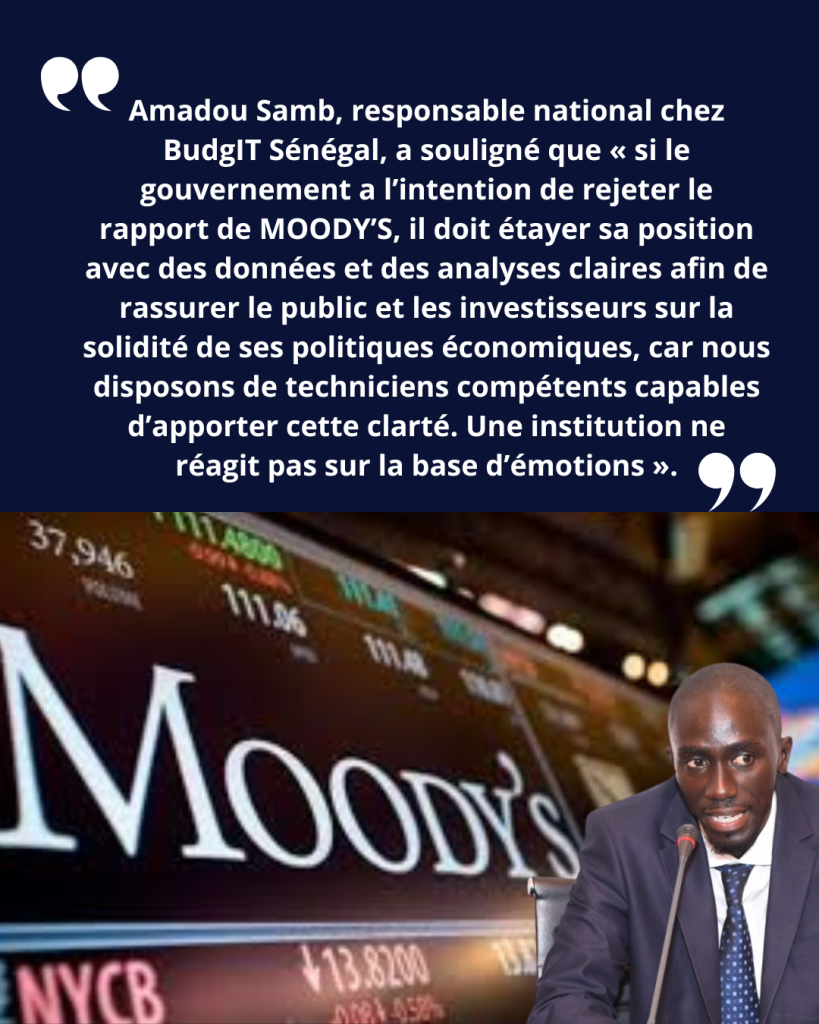+221773916180
FOR IMMEDIATE RELEASE
Dakar, Senegal –
Date: 13.10.2025
Following the decision by MOODY’s to downgrade Senegal’s credit rating from B3 to Caal, BudgIT Senegal calls on the Ministry of Finance to provide the public with a transparent and data-backed explanation of the nation’s fiscal situation and the implications for Senegalese citizens.
The downgrade highlights an ongoing economic crisis stemming from a recently discovered $7 billion hidden debt, which has pushed Senegal’s debt-to-GDP ratio over 100% and led to a downgrade in its credit rating by S&P, MOODY’s, among others. This situation occurred after the accusation of the previous government’s opaque borrowing practices, which appears to be the primary cause, forcing the new government to implement austerity measures like tax hikes and spending cuts. This has resulted in the freezing of IMF loans, welfare payment cuts, and concerns about the impact on citizens and future economic growth.
MOODY’s downgraded Senegal’s long-term issuer ratings from B3 to Caa1 for both foreign and local currencies, citing increased risks related to public debt and liquidity since February 2025. The country’s public debt is now estimated at 119% of GDP for 2024, significantly above previous estimates, and the debt-to-public revenue ratio is projected to reach 581%, indicating a heavy fiscal burden.
The agency also pointed out slow progress in negotiations with the International Monetary Fund (IMF) for a new program, which leaves Senegal dependent on the more expensive regional WAEMU market for borrowing. By the end of September, the government raised 8% of GDP through treasury bills and bonds at high interest rates, increasing liquidity risks.
MOODY anticipates potential IMF support by mid-2026 without necessitating debt restructuring, but confidence in this scenario has diminished. Senegal’s gross financing needs are estimated at 26% of GDP for 2025 and 2026, with interest payments projected to reach 27% of public revenue, further stressing liquidity. Additionally, MOODY’s lowered the local currency limit from Ba2 to Ba3 and the foreign currency limit from Ba3 to B1.
This decision drew strong criticism from the Ministry of Finance and Budget, which denounced MOODY’s methods and analysis and the third downgrade of its sovereign rating by the same agency in less than a year.
Commenting, Amadou Samb, Country Lead at BudgIT Senegal, stressed that “If the government intends to reject MOODY’s report, it must substantiate its position with clear data and analysis to reassure the public and investors of the soundness of its economic policies, because we have capable technicians who can provide this clarity. An institution does not react based on emotion.”
While we acknowledge the efforts made by the Senegalese government in striving for economic stability and growth, it is imperative to clarify that these attempts do not fully reflect the underlying challenges our economy faces. The downgrade by MOODY’s is a more stark reminder of the need for increased transparency and accountability in our financial governance than an attempt to discredit Senegal’s government.
We urge the Ministry of Finance to engage in increased open dialogue with civil society organizations, stakeholders, and the general public. This engagement is crucial to fostering trust and ensuring that all parties are informed about the steps being taken to navigate our economic landscape effectively.
Senegal stands at a crossroads, and the path we choose will significantly impact our citizens’ future. Transparency and collaboration are vital as we work towards a resilient economy that serves the interests of all Senegalese people.
Signed
Elhadj Amadou Samb
Country Lead, BudgIT Senegal
